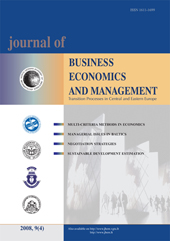Web-Based Model of Multiple Criteria Ethical Decision-Making for Ethical Behaviour of Students
Web-Based Model of Multiple Criteria Ethical Decision-Making for Ethical Behaviour of Students
Author(s): Rita Budzevičienė, Artūras Kaklauskas, Edmundas Kazimieras ZavadskasSubject(s): Economy
Published by: Vilnius Gediminas Technical University
Keywords: distance learning; EURASIA project; Ethical Decision-Making Models; VEBER online questionnaire; Decision Support System
Summary/Abstract: Lately, distance studies, which are attempting at the best possible education for students and satisfaction of as many of their study needs as possible, are gaining wider popularity. Online questionnaires are increasingly used to get detailed opinions of distance learning students on various issues of studies. During the project EURASIA, it was identified that VEBER online questionnaire can be a useful tool for VGTU beyond the scope of the project EURASIA. An online questionnaire has been developed to facilitate the process of surveying related to implementation of the project EURASIA. The assessments helped to recognise that this tool helps VGTU to enhance its institutional system related to e-learning. Having identified the potential of this tool outside the scope of the EURASIA to project, further experiments have been carried out to assess how this tool can be further developed to accommodate the requirements of the project EURASIA other institutional systems. The research showed that distance learning students not only want to express their opinion about the study process, but also to be active participants in shaping strategic alternatives of the study process by electronic means. In order to implement this idea, the authors proposed the Web-based Model of Multiple Criteria Ethical Decision-Making for Ethical Behaviour of Students and used as a basis to develop the Ethical Web-Based Decision Support System (E-DS). Using the features of the VEBER online questionnaire, the developed Model and the E-DS System, the process of distance learning can be additionally humanized and adjusted to ethical norms, which would have a positive effect on the whole distance learning process. Thus, the institutions participating in the project EURASIA or offering distance learning studies could use the features of VEBER online questionnaire, the developed Model and the E-DS System in their activities. It would stimulate more efficient application of moral norms in the distance learning process.
Journal: Journal of Business Economics and Management
- Issue Year: 2009
- Issue No: 1
- Page Range: 71-84
- Page Count: 14
- Language: English

